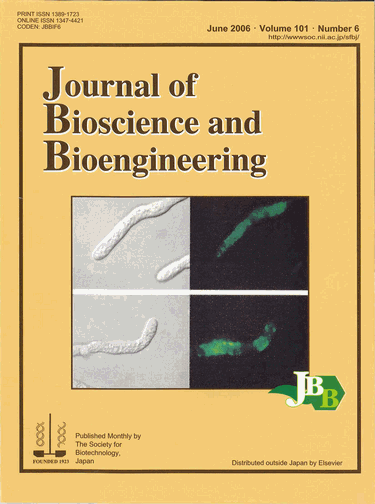Journal of Bioscience and Bioengineering Vol. 101, No. 6 (2006)
Vol. 101, June 2006
Membrane-bound lipase responsible for biodiesel-fuel production.
The use of immobilized fungal cells as whole-cell biocatalysts represents an attractive process for creating new application, particularly in the bulk production of commodity-type products such as biodiesel and polyesters. The immobilized fungus Rhizopus oryzae cells catalyze the methanolysis of plant oils, the products of which can be used as biodiesel fuel. Immobilized growing cells of R. oryzae produce two types of lipases, cell wall- and membrane-bound lipases, both of which are induced in the presence of olive oil or oleic acid.
The microscopy of immunofluorescence-labeled R. oryzae cells indicated that the green fluorescence of immunostained lipase was more clearly observed in the hyphal cell wall of cells cultivated with olive oil (below, right), when compared with that of cells cultured in the absence of the oil (above, right). Together with the biochemical analysis of lipase localization, the authors concluded that the membrane-bound lipase plays a crucial role in the methanolysis activity of the fungus cells.
Related article: Hama, S., Tamalampudi, S., Fukumizu, T., Miura, K., Yamaji, H., Kondo, A., and Fukuda, H., “Lipase localization in Rhizopus oryzae cells immobilized within biomass support particles for use as whole-cell biocatalysts in biodiesel-fuel production“, J. Biosci. Bioeng., vol. 101, 328-333 (2006).
⇒JBBアーカイブ:Vol.107 (2009) ~最新号
⇒JBBアーカイブ:Vol. 93(2002)~Vol. 106(2008)
